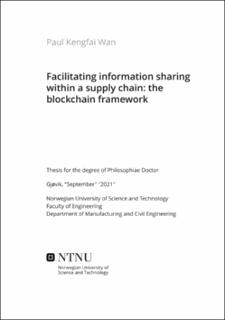| dc.contributor.advisor | Huang, Lizhen | |
| dc.contributor.advisor | Holtskog, Halvor | |
| dc.contributor.advisor | Nowostawski, Mariusz | |
| dc.contributor.author | Wan, Paul Kengfai | |
| dc.date.accessioned | 2021-09-23T13:43:10Z | |
| dc.date.available | 2021-09-23T13:43:10Z | |
| dc.date.issued | 2021 | |
| dc.identifier.isbn | 978-82-326-6104-6 | |
| dc.identifier.issn | 2703-8084 | |
| dc.identifier.uri | https://hdl.handle.net/11250/2780814 | |
| dc.description.abstract | Firms focus on their core functions and engage in collaborative cooperation as a strategy to remain competitive. In recent decades, service industries such as providing medical check-ups and electric utilities have played a vital role in complex supply chains. A service chain is purely an intangible service that does not directly involve physical products.
Information sharing is a key aspect of establishing cooperation, as well as being the main element in opening new services. Firms invest in monitoring mechanisms, such as engaging an intermediate third party, to reduce information asymmetry, but often this comes at a cost and is often linked to opportunistic behaviour. Although third-party services can reduce information asymmetry, the reliability of the shared information remains a challenge.
Blockchain is a digital distributed computing network in which no member of the network can falsify or control the information it contains. The data-storage structure of blockchain makes tampering evident along with the consensus mechanism that maintains the integrity of the data. The smart contract is another feature of blockchain that has caught the attention of researchers, as it can facilitate information sharing without human intervention, thereby reducing human error and cost. This has also sparked an interest in how blockchain can play a role in horizontal and vertical information sharing in different industries.
To acquire deeper insights into these issues, this thesis starts with a systematic literature review in order to assess the current state of the art in information sharing using blockchain. Three case studies: health care, and the smart city and energy sectors, all different in nature, are examined. Blockchain-based frameworks are designed in accordance with their boundary conditions and requirements respectively. The present case study shows that blockchain with a smart contract can enable a new form of data-information sharing, a vertical level between service provider and building owner. This can open up new services and increase efficiency within a complex chain of stakeholders. Another outcome of this research on horizontal information sharing is that the latter gives patients in the healthcare sector certain benefits, such as reducing preventable medication error through collaborative care decisions and clinician burn-out. Blockchain can also reduce the dependence on third parties and complement the centralized database.
Although blockchain technology can facilitate information sharing within a supply chain, it is not a copy-and-paste approach. It is vital to study the nature of the domain, the technical requirements and boundary conditions like privacy in order to design a feasible solution using blockchain technology. Some future work, such as implementing these solutions in a real-world scenario to generate actual performances, are needed to gain support from top leaders in incorporating this technology for information sharing purposes. | en_US |
| dc.language.iso | eng | en_US |
| dc.publisher | NTNU | en_US |
| dc.relation.ispartofseries | Doctoral theses at NTNU;2021:282 | |
| dc.relation.haspart | Paper A: Wan, Paul Kengfai; Huang, Lizhen; Holtskog, Halvor. Blockchain-Enabled Information Sharing Within a Supply Chain: A Systematic Literature Review. IEEE Access 2020 ;Volum 8. s. 49645-49656 https://doi.org/10.1109/ACCESS.2020.2980142 | en_US |
| dc.relation.haspart | Paper B: Wan, Paul Kengfai; Satybaldy, Abylay; Huang, Lizhen; Holtskog, Halvor; Nowostawski, Mariusz. Reducing alert fatigue by sharing low-level alerts with patients and enhancing collaborative decision-making using blockchain technology: Scoping review and proposed framework (MedAlert).. Journal of Medical Internet Research 2020 ;Volum 22.(10) https://doi.org/10.2196/22013 10.2196/22013 This is an open-access article distributed under the terms of the Creative Commons Attribution License (https://creativecommons.org/licenses/by/4.0/) (CC BY 4.0) | en_US |
| dc.relation.haspart | Paper C:
Wan, Paul Kengfai; Lai,Zhichen; Liu,Xiufeng; Nowostawski,Mariusz.; Holtskog, Halvor; Huang, Lizhen; Yu,Guanghua.
Development of blockchain-based automated infectious risk assessment alert system: A case study in an office building. | en_US |
| dc.relation.haspart | Paper D:
Wan, Paul Kengfai; Huang, Lizhen.
Energy tracing and blockchain technology: current state-of-art | en_US |
| dc.title | Facilitating information sharing within a supply chain: the blockchain framework | en_US |
| dc.type | Doctoral thesis | en_US |
| dc.subject.nsi | VDP::Technology: 500::Environmental engineering: 610 | en_US |

